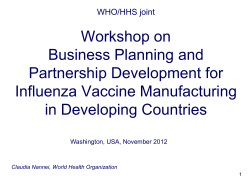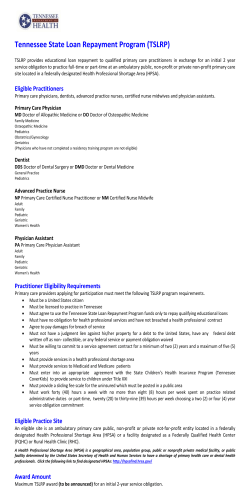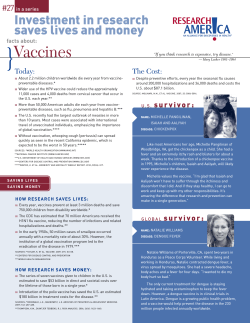
The Drug Shortage Debacle—And How to Fix It
Awi Federgruen: The Drug Shortage Debacle—And How to Fix It - WSJ.com 11/6/12 Tuesday3:50 PM News, Quotes, Companies, Videos Robert Rossana U.S. EDITION Home World My Journal Thursday, March 1, 2012 As of 7:17 PM EST U.S. New York Business Peggy Noonan's Blog Tech Markets Leisure & Arts Market Data Book Reviews Opinion Stephens: Liberal Exceptionalism Opinion Life & Culture Letters to the Editor 1 of 12 TOP STORIES IN OPINION SEARCH Real Estate Political Diary Careers Columns 2 of 12 3 of 12 McGurn: Sandy and the Failures of Blue-Statism Randy Barnett: The Mistake That Is the Libertarian Party Dodd-Frank's Finan Outsourcing March 1, 2012, 7:17 p.m. ET The Drug Shortage Debacle—And How to Fix It The National Vaccine Advisory Committee says government price controls are the primary reason for the decline in the number of suppliers. Article Comments (39) By AWI FEDERGRUEN Last week brought news of major shortages for two critical cancer drugs. Methotrexate is the essential treatment for one of the most common forms of pediatric leukemia, while Doxil is used to treat ovarian cancer and AIDS-related sarcoma. The shortages occurred when Benvenue, one of only four domestic suppliers, closed its plant because it could no longer guarantee product safety. These shortages were not rare episodes. Last year, a record of 267 drug shortages were reported, up from 58 in 2004. Even more tragically, most 2011 shortages remain unresolved. What's going on? First, the number of suppliers of generic drugs has dwindled. There were 26 U.S. vaccine makers in 1967; today there are only six. Supply disruptions are common, including the possibility that a facility completely shuts down for a protracted time because of quality or safety problems. Second, unlike in most consumer-goods industries, many pharmaceutical manufacturers have failed to invest in the technology and quality-control improvements that would reduce the risks of partial or complete facility shutdowns —and this despite the FDA's regularly issued guidelines for good manufacturing practices. Behind both problems are the government's tight price controls for generic drugs, especially when purchased by Medicare and Medicaid. Low prices induce drug makers to exit various markets, or at least to reallocate their manufacturing capacity toward more profitable, patented pharmaceuticals. Low prices also tend to eliminate the rationale for investments in better manufacturing technologies and processes, as shown in my 2009 study in the Journal of Management Science. Government price controls on generic drugs limit the manufacturers' margin to 6% in many cases. In the case of vaccines, for example, the Centers for Disease Control and Prevention pays as little for generics as it can negotiate. This results in an average http://online.wsj.com/article/SB10001424052970203986604577253242913478400.html MORE IN OPINION » Don't Miss Powered by Taboola Opinion Journal: Is Keeping Fit, One Obama the Step at a Time Underdog?--Rob 02:53 Pollock previews t… Opinion Journal: Biden's Intelligence -- Bret Stephens on Joe Biden and Pa… 04:53 02:47 Most Popular in US 'I'm Calling It for Mitt' Five Things to Watch on Election Night Election Goes Down to Wire Who Will Win? Stephens: Liberal Exceptionalism More in Opinion Stephens: Liberal Exceptionalism McGurn: Sandy and the Failures of Blue-Statism Randy Barnett: The Mistake That Is the Libertarian Party Dodd-Frank's Financial Outsourcing The FHA's November Surprise Most Popular Read Emailed Video Commented 1. 'I'm Calling It for Mitt' 2. Five Things to Watch on Election Night Page 1 of 3 Awi Federgruen: The Drug Shortage Debacle—And How to Fix It - WSJ.com reduction of 40% off the catalog price that applies to sales in the private sector, according to a 2006 study in the journal Clinical Infectious Diseases. As that study noted, the federal government's own National Vaccine Advisory Committee identified price controls as the primary reason for the dramatic decline in the number of suppliers. Second, the government's oversight of manufacturing safety and quality is unnecessarily contributing to shortage problems. The pharmaceutical industry generates many applications for new manufacturing facilities and manufacturing processes within existing facilities. The government has failed to allocate the money to hire enough reviewers to analyze the applications or inspectors to visit the facilities. 11/6/12 Tuesday3:50 PM 3. Election Goes Down to Wire 4. Who Will Win? 5. Opinion: Stephens: Liberal Exceptionalism Most Read Articles Feed Latest Headlines Voters at Last Have Their Say One Dead, Four Wounded in California Workplace Shooting Gay-Marriage Votes Test if Views Have Shifted The backlog of applications for new generic drug facilities and manufacturing processes at the FDA remains a year long, according to the Generic Pharmaceutical Association, and generic drug reviews take 15 months longer on average than evaluations of brand-name products. The generic drug industry, tired of the government's inability to execute, has proposed providing the agency with $299 million in annual fees. It is clear that the way to resolve the shortage of critical drugs is to relax or eliminate government price controls, and to increase the FDA's review and inspection capacities. In the latter case the generic drug industry is willing to foot most or all of the bill. Freddie Mac Swings to Profit Watchdog: Donor 'Laundered' Cash Tough Calls on Deficit Await the Winner Pakistani Woman's U.S. Sentence Upheld Sandy's Aftermath Bloomberg Suggests Partial Evacuation Ahead of New Storm Slow Reboot for Schools More Headlines Unfortunately, the Obama administration has thus far pursued the opposite objective, at least as far as price controls are concerned. Last November, it issued an executive order instructing the FDA to report any violations of price controls to the Justice Department. It is not as if President Obama is unaware of incentives. His best-known statement about the health-care industry is: "The doctor may look at the reimbursement system," he declared during a news conference in 2009, "and say to himself, 'You know what? I make a lot more money if I take this kid's tonsils out," rather than treating him for allergies. Nevertheless, this elementary insight seems to have eluded his administration in the case of drug shortages. The industry's FDA funding proposal should be approved as part of the upcoming renewal of the Prescription Drug User Fee Act. This may be one of the few areas in which Congress and the Obama administration could find common ground. The benefits are high in relation to the costs. In the fall of 2004, the nation faced a major shortage of the flu vaccine due to an unexpected closure of Chiron Corp.s plant in the United Kingdom. The problem caused alarm, and with good reason. Even in a year without a vaccine shortage, no less than 200,000 hospitalizations and approximately 36,000 deaths are directly attributed to influenza or resulting complications. The annual economic burden imposed by influenza alone, according to a study in the journal Vaccine, has been estimated at $87 billion, while the part of the FDA budget paid by the taxpayer, amounts to $3.5 billion. In the years since, the number of drugs with major shortages has more than quadrupled. Fortunately, the cure for this problem is within our reach. Mr. Federgruen is a professor at Columbia Business School. JOIN THE DISCUSSION 39 Comments, add yours MORE IN Opinion » http://online.wsj.com/article/SB10001424052970203986604577253242913478400.html Page 2 of 3 Awi Federgruen: The Drug Shortage Debacle—And How to Fix It - WSJ.com You Might Like 11/6/12 Tuesday3:50 PM From Around the Web Content from Sponsors What's this? The Shifting Terrain of Sex in China How the Romney-Ryan Economy Would Destroy Capitalism (TheStreet) ‘Saturday Night Live’ Sends Up Hurricane Sandy 10 Insanely Overpaid Public Employees (The No Doubt Pulls Video ‘Looking Hot’ After Charges of Racism Fiscal Times) Is Apple’s Tablet Dominance Coming to an End? Donald Trump's Big Obama 'Bombshell' May Be Divorce Papers (CafeMom) Sellouts? Famous African-Americans You’d Never Suspect Had Republican Ties (Bossip) Obamas’ Strong Marriage Produces White House Drama, Dysfunction (Bloomberg.com) Add a Comment JOURNAL COMMUNITY View All Comments (39) Community rules All comments will display your real name. Start typing your comments here... Track replies to my comment CLEAR Login with Facebook POST Editors' Picks For These Low-Riding Bikers, a Third Wheel Is Welcome Formula 1 Hits a Scary Turn Weighing the Polls, and the Pollsters Past and Future Clash at Pearl Harbor Wall StreetFacebook JournalTwitter LinkedInFourSquare Google+YouTubePodcasts RSS Feed Trinket-Seller Rides Out Turbulence AppStore Back to Top Customer Service Policy Ads Tools & Features More Customer Center Privacy Policy Your Ad Choices Apps Reprints Contact Us Data Policy Advertise Newsletters E-books Contact Directory Copyright Policy Advertise Locally Alerts Content Partnerships Corrections Updated: Subscriber Agreement & Terms of Use Place a Classified Ad Graphics & Photos Conferences Columns SafeHouse Topics Guides Jobs at WSJ http://online.wsj.com/article/SB10001424052970203986604577253242913478400.html Copyright ©2012 Dow Jones & Company, Inc. All Rights Reserved. Page 3 of 3
© Copyright 2026











